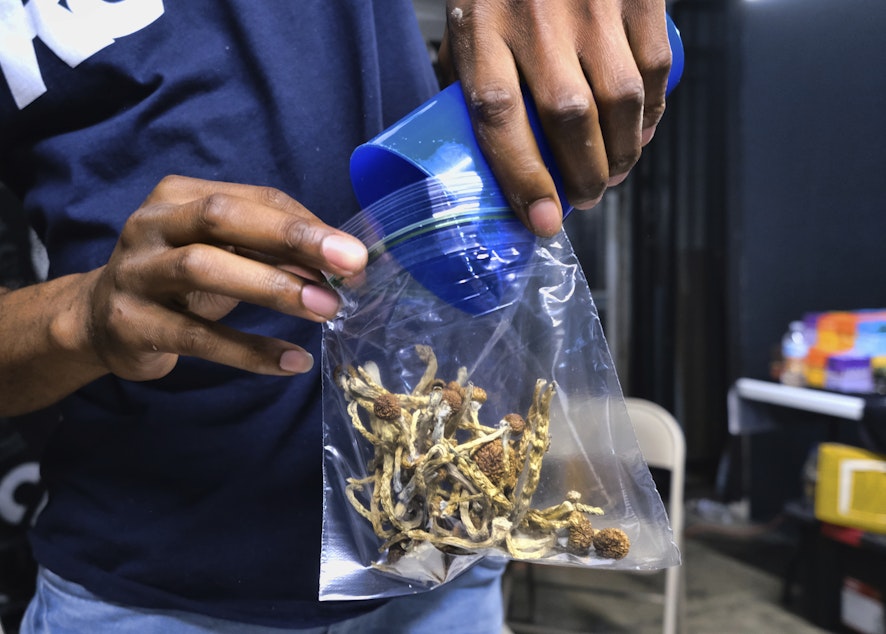Seattle police won't pull you over for this: Today So Far

- Seattle police will stop pulling over drivers for a handful of infractions. And they'll stop pulling over people for not wearing bike helmets.
- Pedestrian fatalities rise in Seattle, despite the city's Vision Zero plan.
- Families find lead in their turmeric.
This post originally appeared in KUOW's Today So Far newsletter for Jan. 27, 2022.
Seattle police are going to pull drivers over less often now that officers will ignore certain infractions — sort of. As KUOW's Amy Radil told Seattle Now, SPD is not going to pull people over for: expired tabs; a missing front license plate; and windshield cracks or hanging an air freshener from a rearview mirror. Also, bicyclists will no longer be stopped for not wearing a helmet. These will still be infractions, but they won't be a primary reason for being stopped. In other words, SPD can pull you over for running a red light, and then could also cite you for not having a front license plate.
Seattle is the first city in Washington to try such an approach. Other cities like Philadelphia and Minneapolis have already made similar moves. It made me wonder how common these infractions are (hanging an air freshener?!). I did some reporting a few years ago that found bike helmet infractions were steadily on the decline in Seattle, and King County in general. In 2017, SPD told me it favored education instead of enforcement for the helmet issue (in 2021, SPD issued one bike helmet ticket). But traffic stops are a different matter. Radil reports that while Black residents make up 7% of Seattle's population, Black drivers are ticketed at three times that rate. Stats like that are what prompted the city to form a workgroup around this issue. Check out today's Seattle Now for more details.
Pedestrian deaths have risen over the past six years, despite Seattle adopting its Vision Zero plan. You may have noticed Seattle dropping speed limits across town — that's part of the Vision Zero plan. The ultimate goal is to eliminate traffic fatalities. But Seattle’s pedestrian fatality rate was 150% higher in the five years after the launch of Vision Zero compared to the five years before. The city's Black, homeless, and senior communities have been disproportionately impacted by this. There are a lot of factors woven into this issue, so I encourage you to read the full details here.
And there's another danger around Seattle, but it's not on the road — turmeric. Yeah, that surprised me too. KUOW's Anna Boiko-Weyrauch found four local cases where lead was found in the spice. The metal can be especially harmful to kids, and it's estimated that about 80% of lead poisoning in Washington's children is never identified. So which turmeric is carrying all that lead? Read here for the full story.
Have a comment or want to reach out to me? Send me an email at dyer@kuow.org.
Sponsored
AS SEEN ON KUOW

Last year, Mental Health America found that more than 1 in 5 adults in Washington state live with a mental illness. Right now, people have options like talk therapy and medication available to help them. But a new option could be on the way: Psilocybin, the active ingredient in “magic mushrooms.” (Richard Vogel / AP)
DID YOU KNOW?
Thomas Edison received his patent for a lightbulb on this day, Jan. 27, 1880. He is often credited with inventing the lightbulb, but that's not entirely accurate. Edison did not invent the lightbulb, but he can be credited with crafting the first practical version that could be widely used.
Sponsored
People knew that electrical current could create light since about 1800. Various lightbulbs were invented prior to Edison's patent using different materials, such as copper, platinum, or carbonized paper filaments, but none were very efficient. Joseph Swan, an English chemist, got a patent for his lightbulb two years before Edison. And like Edison's bulb, Swan's used a vacuum tube. Edison improved upon this idea, making a stronger bulb that could be mass produced and cost effective. Swan liked Edison's idea, incorporated it into his own invention, and started an electric lighting company. That didn't sit well with Edison who then sued Swan. However, despite the initial conflict, the two ended up joining forces to become one of the world's largest producers of lightbulbs.
What else don't we know? Email us at hello@kuow.org.

